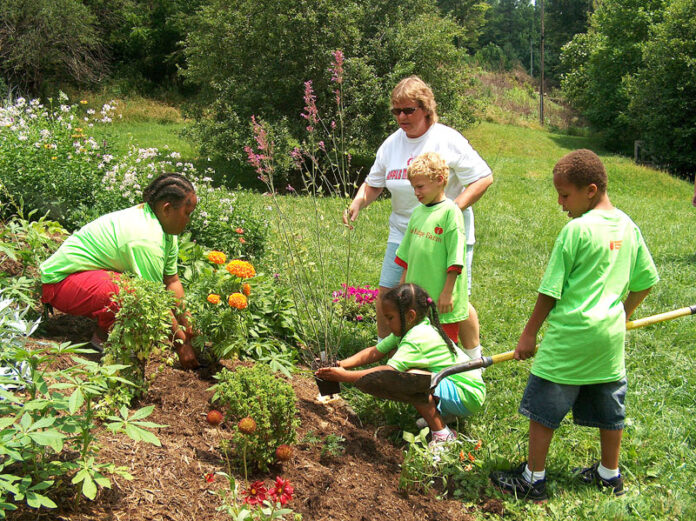
From the time he was eight years old until he was about 16, Peter Lewis spent summers on his aunt and uncle’s dairy farm in Warrenton, Virginia, located approximately 45 miles south of Washington D.C. He truly relished that experience. When he began a teaching career in Washington, Lewis began taking kids to the farm and witnessed the positive impact the outdoor environment had on them. That’s when he decided to buy a farm and start a camp to provide the opportunity for inner-city youth to visit such a setting.
In 1975 Lewis acquired a Floyd County farm to establish such a retreat and began hosting Washington and Roanoke area children during the summers. In 1978 Apple Ridge Farm was incorporated as a non-profit organization. Located in Copper Hill, the farm will mark its twenty-second year this summer of providing inner city and at-risk youths with outdoor activities and academic programs.
Many of the children come from urban areas in Roanoke and the surrounding counties of Southwest Virginia. Lewis feels that many children who grow up in an urban environment lack the chance to explore a semi-wilderness area.
“I think it really improves them because they are very interested to find out what’s here – what kind of animals do you have, and what kind of things are going on. I explain all of that to them, as do my educators, and they’re very interested.”
Apple Ridge offers four different camp sessions—each one aimed at a specific age group. The first session this year will offer classes in math and computers, reading and writing, environmental science, gardening, swimming, and tennis for younger children. The second session will provide sessions for the older kids on how to prepare for life beyond high school.
“It’s not IF you finish high school,” Lewis stresses, “it’s WHEN you finish high school. We’re always stressing the importance of obtaining a good education because if you have a good education, there’s nothing you can’t achieve.”
As part of its program for older attendees, Apple Ridge holds career days, where professionals from diverse fields come and speak to the students. They also take students on visits to regional colleges, where they learn what it takes to be successful in the business world and how to prepare for life post-high school.
Because of what he calls “ineffective parenting” and media’s negative images of young people, Lewis feels it is important that adults provide appropriate examples to today’s children – which is why Apple Ridge emphasizes old-fashioned values.
“We have very high expectations, and we expect these children to be well-behaved. And because we are, the children follow our lead. We try to be appropriate role models always,” says Lewis, who has an office at the Jefferson Center.
“We hire people who are appropriate role models, and we don’t tolerate bad behavior. When the children find out that that’s our mantra they fall in line. We always have people who say our kids are so well mannered, so respectful and so courteous. Well, that’s because we insist on it.”
Many of the children who’ve attended Apple Ridge have done well in high school and college and are now working or are in military service. “We’ve had children go to a number of schools across Virginia and beyond,” says Lewis, “I’m very proud of our kids.”
Apple Ridge receives support from various sources: churches, businesses, foundations, banks, insurance companies, and private individuals. Moreover, the farm has a conference center available for use by various businesses and organizations for a rental fee.
Such support is crucial – the children attending Apple Ridge do so tuition-free. “We’re always looking for novel ways to support the children who otherwise could not afford the tuition to come to camps,” says Lewis.
Lewis hopes to retire within three to four years and assume an advisory role. “I’m hoping that, especially with the use of the conference center, we can operate this program in perpetuity, because we’re really looking to expand our offerings there. We have a wonderful facility to meet and to have off-site meetings for businesses. We hope to support our program by getting the general community [more] involved.”
Those seeking further information can call the Apple Ridge Farm office at (540) 982-1322 or go online at www.appleridge.org or email at [email protected].

